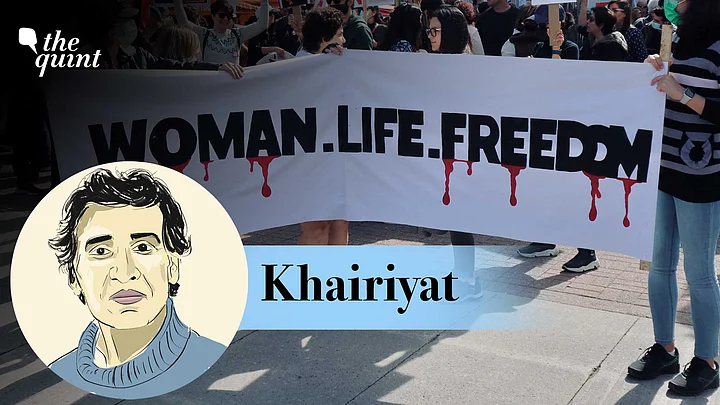On 8 October, I joined about 1,500 people, who went in a procession to the Aarhus town hall to express their support for the protests in Iran. One of the slogans raised has by now become legendary: Zan, Zindagi, Azaadi! (Woman, Life, Freedom!)
Many such protests are taking place in different cities and towns, inside and outside Iran. They started on 17 September, soon after Ms Mahsa Amini, a 22-year-old Iranian-Kurd, died in custody on 16 September—three days after her arrest. She had been detailed in Tehran by the 'morality police' for allegedly not covering her hair properly.
The protests have been widespread, and are still growing despite the fact that, according to Human Rights groups, more than 150 people have been killed since they began. Many of the killed have been young men and women who simply want to be able to dress, live and vote freely.
A Tale of Two 'Conservatively' Dressed Women
As I walked up the pedestrian street towards the town hall on 8 October, I could see that most of the Iranian women and girls in the procession were dressed in, shall we say, secular clothes. They were clad in dresses, trousers, jeans and similar attires, though many had their hair loosely covered with scarves.
For a short while, however, we were joined by two young women who were dressed in a more ‘strict’ manner: they were wearing long black robes over their dresses, and though their faces were not covered, their hair was tightly wrapped in the kind of black scarves that religious Muslim women wear when they do not want to adopt the full veil.
I wondered what they were doing in the procession, as one of the things that many of the protestors have been demanding is individual freedom for women to adopt or reject the hijab and other forms of veiling.
Women in Iran have, with awe-inspiring bravery, made public demonstrations to this effect, such as taking off their scarves or cutting their hair short. Hence, I was surprised to see these two conservatively dressed women—dressed in a way that would not have caused them any trouble in Iran or Saudi Arabia—in the procession.
If You Don't Others, What Happens to Your Own Rights?
It turned out that they were from a Somalian background, and had grown up in Denmark, where they had decided to dress in what they considered a ‘Muslim’ manner. They did so as a personal choice: it was the way they interpreted and lived their faith. But they did not want their choice to be imposed on others. They felt that, as believing Muslim women who dressed in a conservative manner, it was their duty to support other Muslim women who, too, wanted to exercise personal choice, even though their choice was to dress differently.
They very acutely noted that they could not demand and exercise the personal choice of dressing in a supposedly ‘Muslim’ manner in Denmark, if they—at the same time—stayed silent when ‘Muslim’ dress codes were imposed on women elsewhere. (The total burqa is not legal in Denmark, though a few women still wear it on the streets and the police look the other way, but the hijab and other forms of veiling are permitted.)
Is Hijab a Religious Equivalent of Fashion?
I was impressed by their clear thinking, but it also struck me that these two women were extremely rare in believing Muslim circles. In India, for instance, most religious Muslims have largely ignored the protests in Iran. And some ‘Muslim leaders’ have wriggled out of the moral dilemma posed by it by saying that it is “a matter for Iran to decide.”
But is it “a matter for Iran to decide” if a certain dress code is being imposed on the Iranian people – by force at times – in the name of your religion? The point is not whether the dress code is right or wrong, whether it is progressive or reactionary. The point is that it is being imposed on people: it is not based on a democratic choice.
This is partly so in almost all overwhelmingly Muslim colonies in South Asia too, where the code is so closely tied to religion and respectability that few women can afford to flout it. But one can argue, as many religious Muslims do, that it is still a personal choice: the religious equivalent of ‘fashion.’
Why Women Should Reject All Forms of Veil
But, alas, that pretence does not work in places like Iran or Saudi Arabia, where dress codes are imposed and policed in public. Iranians protestors are not demanding that Muslim women should discard all forms of the veil. They are simply demanding that it should be a free choice.
Unfortunately, even many progressive Muslims do not think clearly about this matter. I once met a cosmopolitan Palestinian (woman) poet, dressed in a completely Western fashion, who felt that she had to defend the veil. Even the bikini is imposed in Europe, she claimed, wilfully confusing fashion with force.
She knew she was wrong. Bikinis are not worn normally on the streets, though, of course, you can, if you choose to do so. And you can go to beaches fully dressed as well. There is no ‘morality police’ in the West beating up women or men who do not wear shorts! I wish there were more religious Muslims, who, like those two semi-veiled Somali-Danish women, objected to the hijab and similar codes being imposed in places like Iran or Saudi Arabia.
(Tabish Khair, is PhD, DPhil, Associate Professor, Aarhus University, Denmark. He tweets @KhairTabish. This is an opinion article and the views expressed are the author’s own. The Quint neither endorses nor is responsible for them.)
